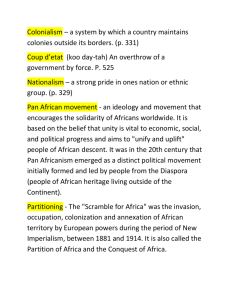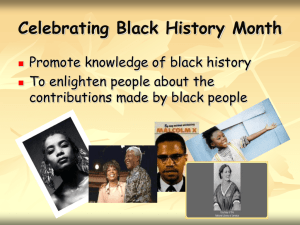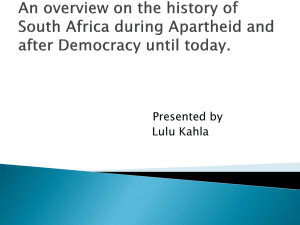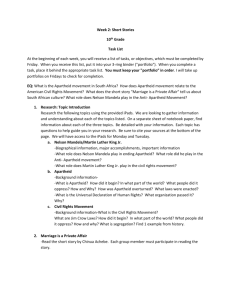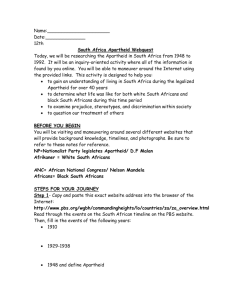(Mr. Dowling). - Cloudfront.net
advertisement
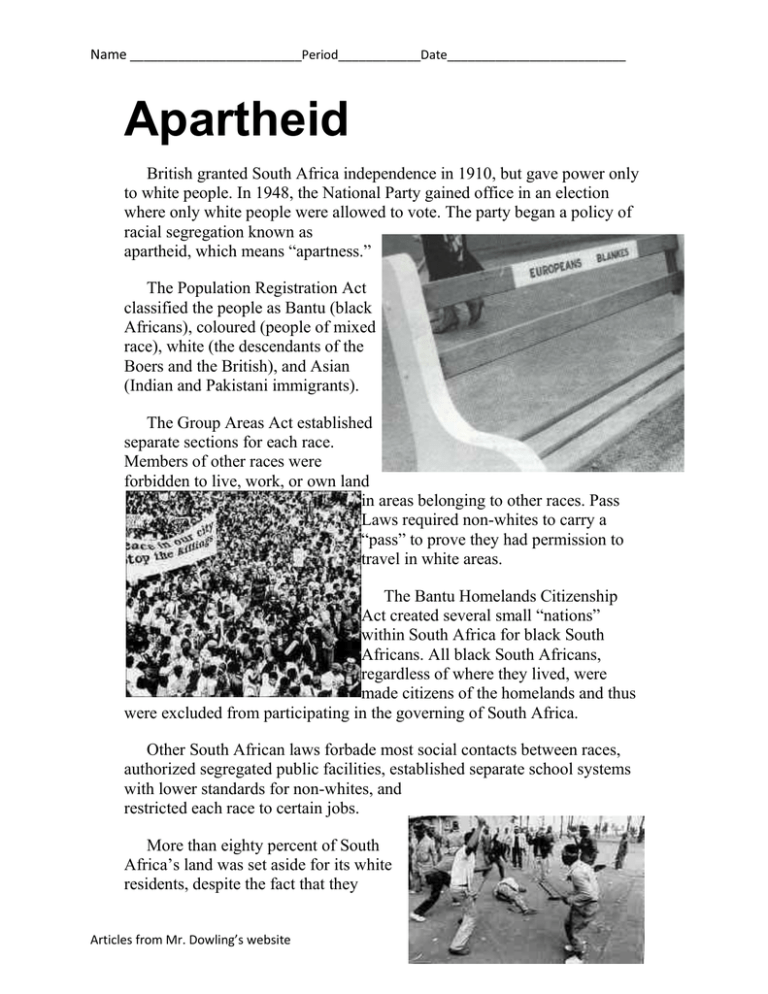
Name _________________________Period____________Date__________________________ Apartheid British granted South Africa independence in 1910, but gave power only to white people. In 1948, the National Party gained office in an election where only white people were allowed to vote. The party began a policy of racial segregation known as apartheid, which means “apartness.” The Population Registration Act classified the people as Bantu (black Africans), coloured (people of mixed race), white (the descendants of the Boers and the British), and Asian (Indian and Pakistani immigrants). The Group Areas Act established separate sections for each race. Members of other races were forbidden to live, work, or own land in areas belonging to other races. Pass Laws required non-whites to carry a “pass” to prove they had permission to travel in white areas. The Bantu Homelands Citizenship Act created several small “nations” within South Africa for black South Africans. All black South Africans, regardless of where they lived, were made citizens of the homelands and thus were excluded from participating in the governing of South Africa. Other South African laws forbade most social contacts between races, authorized segregated public facilities, established separate school systems with lower standards for non-whites, and restricted each race to certain jobs. More than eighty percent of South Africa’s land was set aside for its white residents, despite the fact that they Articles from Mr. Dowling’s website Name _________________________Period____________Date__________________________ comprised less than ten percent of the population. South Africa’s black majority had resisted apartheid for many years. They began rioting in 1976, when the South African government tried to force black children in the Soweto township to learn Afrikaans, one of the languages of the white minority. The rioting continued for the next fourteen years until the apartheid laws were repealed. The world community made South Africa a pariah because of its racial policies. The nation was forced to leave the Commonwealth, an alliance of former British colonies, in 1961. In 1985, both the United Kingdom and the United States imposed restrictions on trade. White South African yielded to world pressure and domestic violence in 1990 by repealing most of the apartheid laws. Three years later, a new constitution gave people of all races the right to vote, and the following year South Africans elected a black man, Nelson Mandela, as president. 1. What does apartheid mean? ______________________________________ 2. What party gained office that instigated a great deal of negative change, and how did they win the election? ________________________________ _____________________________________________________________ _____________________________________________________________ 3. Which act classified people into groups? ____________________________ 4. Which act separated these groups and defined where they could live, work, or own land? __________________________________________________ 5. How did the Bantu Homelands Citizenship Act prevent black South Africans from participating in the government? ______________________________ _____________________________________________________________ 6. What was the final straw for South Africa’s black majority? _____________ _____________________________________________________________ 7. How did the world influence change in South Africa? __________________ _____________________________________________________________ _____________________________________________________________ 8. What event proved the apartheid laws were no longer in place? _________ _____________________________________________________________ Articles from Mr. Dowling’s website Name _________________________Period____________Date__________________________ Nelson Mandela Nelson Mandela led the African National Congress, a black liberation group that opposed South Africa’s white minority government and apartheid. Mandela was initially opposed to violence, but after a massacre of unarmed black South Africans in 1962, he began advocating acts of sabotage against the government. In 1962, Mandela began a twenty-seven year stay in prison. Most of his confinement was spent during hard labor at the notorious Robben Island maximum-security prison. During his imprisonment, Mandela became a symbol of the anti-apartheid movement among South Africa’s black population and among the international community that opposed apartheid. Mandela rejected several government offers to allow him to leave prison on the condition that he renounce violence. Mandela was released from prison and instantly became an international celebrity. Mandela shared the Nobel Peace Prize in 1993 with F.W. deKlerk, South Africa’s last white president. Their combined efforts ended apartheid and brought about a peaceful transition to nonracial democracy in South Africa. Three years after his release, South Africans of all races were allowed to vote for the first time in a national election. They selected Mandela as their Articles from Mr. Dowling’s website Name _________________________Period____________Date__________________________ president, giving him 62% of the vote. The same person who was once a symbol of black resistance in South Africa later eventually became the nation’s first black president. Mandela’s government was praised for its treatment of South Africa’s white minorities. One white South African told our class in 1996 that "[Mandela] has treated us better than we treated him.” In the interviews I conducted over the Internet in the late 1990s, no South African of any race had kind words for apartheid. Mandela's government had its critics. Crime increased during his term, but the violent war between the races ended. Every South African I spoke with said life is better today than it was before Mandela took power. Mandela married for the third time on his 80th birthday in 1998. A year later he retired from the presidency. The 400-year-old prison on Robben Island is now a museum 9. What event changed Nelson Mandela’s view on violence? _____________ _____________________________________________________________ 10.Why was Nelson Mandela imprisoned and for how many years? _________ _____________________________________________________________ 11.What did Mandela symbolize? ____________________________________ 12.Why did he win a Nobel Peace Prize? _______________________________ _____________________________________________________________ 13.How many years after his release from prison did it take for all races to have the right to vote? __________________________________________ 14.After Mandela was elected president, for what was his government praised? ______________________________________________________ _____________________________________________________________ 15.What negative result was seen during his presidency? _________________ _____________________________________________________________ Articles from Mr. Dowling’s website

